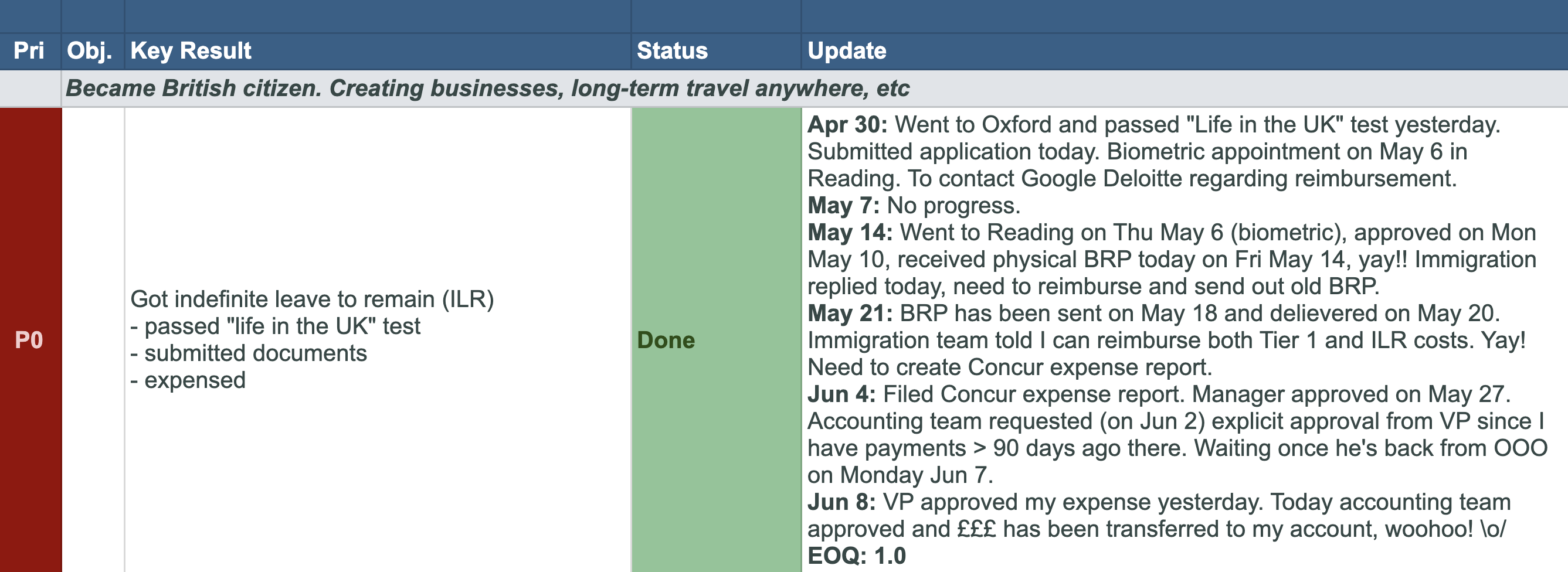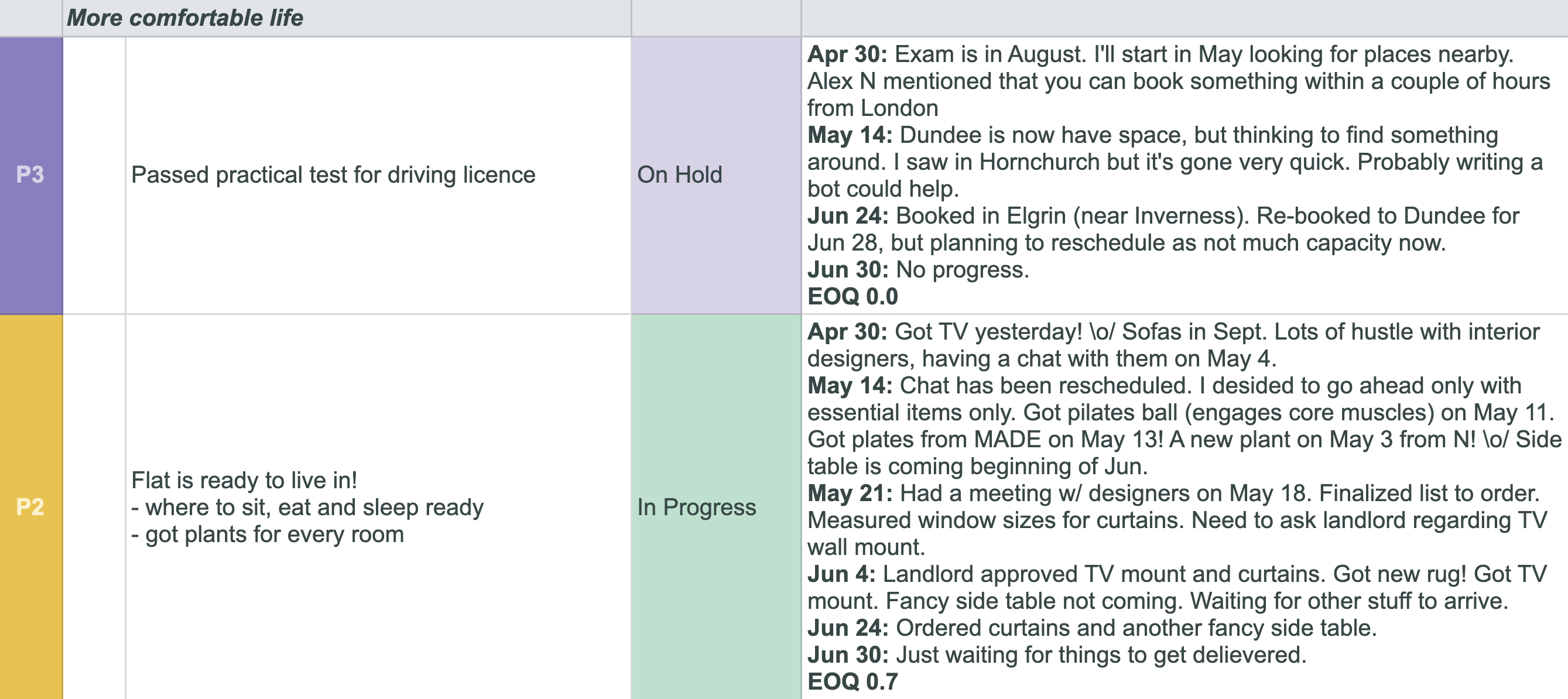Happy New Year everyone! Now is a good time to think of what you want from life and come up with your New Year's resolutions.
In this post I wanted to share my approach to staying on track with my goals, and hopefully providing you simple yet powerful tools to achieve your goals, which are based on using personal OKRs (similar to how we do it at Google).
Design your life
I always found it super exciting to get a piece of paper and write down everything I want to have in life - basically design my dream life from scratch!
Here's some techniques I've heard people use to brainstorm it:
- Write down 100 things you want (straightforward, but powerful).
- You can ask "why?" multiple times (5 whys), to understand the root-cause of why you want this.
- Think of not only what you desire, but also what you hate, what annoys you the most. If you perform 5 whys technique on both, you would be surprised sometimes to see the same underlying drivers!
- Think where you want to be in one year from now, and ask yourself what stops you from being there now, and maybe how you can get there faster.
- Past year review approach by Tim Ferris, where you go through your calendar from the last year and write down any people, activities or commitments that triggered peak positive or negative emotions. Then choose 20% of positive things that bring you 80% of joy, and do more of that next year! Huge thanks @alisique for suggesting this.
How do you usually approach this? I tried even hiring a life coach for this, it was fun, I'll tell more in a separate post.
Execution is hard
Coming up with what you want is only a half of the challenge. The other half is actually to organise all this mess of ideas that you have, prioritise and execute on your goals! This could be very very hard!
One thing at a time
I have a problem, that I always want to do too many things at once. Over time I noticed that for me it works really well, when I do the following:
- Prioritise 1-3 most important goals (instead of 5-8 goals).
- Focus on these important goals for a while (say for 3 months).
- Actively drop everything else, that doesn't fall into 1-3 of the active goals.
- After 3 months repeat the process, prioritise again...
The time range (say, 3 months) could vary. E.g. if you want to learn text editor Vim/Emacs, a good strategy would be to try installing 1-3 plugins first and mastering them for a week a two. Once you're comfortable with them, you can install next 1-3 plugins and start focusing on them, etc. This is much better than throwing 20 plugins at once and getting nothing out of this.
The same principle with a different time range easily applicable to the long-term goals. Say you can focus on one domain for 3-5 years and become an expert there, then move into another domain where you can leverage skills from the previous domain, and so on.
Personal OKRs
I usually define measurable goals and track their outcomes by using personal OKRs (Objectives and Key Results).
You're probably well familiar with this framework. A lot of big and small companies use it. For example, at Google we track our personal, team and company goals using OKRs. It's a very powerful tool.
Setting up OKRs is easy, you need to:
- Define objectives. Objective is a significant, concrete, clearly defined goal. This needs to be important and ideally inspiring for you!
- Define 3-5 key results for each objective. Key result is a measurable success criteria used to track the achievement of that goal.
- Establish priorities for everything.
- Focus on executing, achieving key results towards objective during one quarter.
- Calculate end-of-quarter (EOQ) score for each key result and analyse.
Before I start explaining everything in more detail, I'll show you a couple of examples. Here's my Q2 2021 OKRs. Q2 means "quarter 2" and corresponds to "April - June" time period. But you can choose arbitrary time range.
This is a super similar way of how we doing it at Google.

To keep things simple, I use a regular spreadsheet. Huge thanks to my brilliant ex-manager Kostas for creating this template long time ago! (this is a slightly modified version of it)
There's a lot of specialised software out there which you can use instead of spreadsheets, but this simple sheet works well for me. You can even use a piece of paper, it's not a big deal.
So, on the picture above you can see it has the following parts:
- priority ("P0" - very high priority, means commitment)
- objective ("Became a British citizen" showing what opportunities it unlocks)
- key result ("Got ILR" - note I use the past tense everywhere)
- current status of the key result ("Done")
- updates (I usually fill them out every week)
- end of quarter (EOQ) score 1.0
Here's a couple of more examples of my objectives and key results from Q2 2021:


Note, this is not an issue tracker, nor a TODO list. So, don't put there everything. The idea is to transform all the mess of your creative ideas and problems you have in life into a list of inspiring/truly important objectives that you will be committed to for a while. Each of these objectives would have a list of measurable key results that need to be achieved in order to fulfil the objective.
Objectives
Objectives are significant, concrete, clearly defined goals or intents. Ideally it should be clear if an objective has been achieved. Usually we describe objectives (and key results) in the past tense. For example: "Achieved financial independence", "Built a sauna", "Got a job as a teacher".
Key Results
Key results are measurable milestones towards an objective. It needs to be clear if the key result was achieved, or how much we managed to achieve it numerically. For example "Put £10k into savings account by March" - you can see if it was accomplished, and can even measure it. Another example "Got a boiler for sauna" - you can buy a new one, or do some custom welding, it doesn't matter, this is implementation details, but it's a milestone that needs to be achieved.
End of quarter (EOQ) score
At the end of the quarter we set a score from 0 to 1 to the key result. 1 means it was achieved, 0 - no progress. Also could be anything in between. E.g. if you managed to put only £3k out of planned £10k into your savings account, that means EOQ is 0.3. If a key result consists out of 2 tasks, and you managed to do only one, EOQ is 0.5.
Commitments and aspirations
All OKRs could be divided into commitments and aspirations:
- Commitments is something incredibly important, if we failed achieving it by the end of the quarter, it's not good, and need to be analysed and justified. In the tracker we set a priority P0 for these.
- Aspirations have less of a priority (P1, P2, P3, P4) - we want to finish them as well, but they're not as important. Aspirations could become commitments in the upcoming quarters.
Review
Quarterly
Every quarter (3 months) I write down a list of all my goals/thoughts an any note taking app. I use 5 whys technique to figure out corresponding objectives.
For example: I though could be "I need a vacuum cleaner". Then I ask myself, why do I need it, and come up smth like "My flat is clean all the time" objective. Then I'm thinking of key results, e.g. "Cleaner came once a week or cleaned myself", etc.
Once I have a list of all objectives and key results, I set priorities and decide which OKRs I should put into the tracker for this quarter (it will be a subset of everything, depending on my capacity).
For the previous quarter I set EOQ scores and trying to analyse what went well, and what didn't. If I managed consistently meet 100% of my goals, then I need to add more goals or come up with more stretch goals and so on.
Weekly
Every week I fill out updates for all the key results. Usually this takes just up to 15 minutes, it's very simple. It's extremely satisfying to mark a key result as "DONE!".
Also I find useful to allocate time in the calendar for the current tasks, so you always know what should you focus on.
Failure
Failure is a part of learning. If you see you're constantly having "No progress" on some key results, you can easily spot this problem and think about why this is happening. If it's a P3 task, it's OK. If it's a P0 task, then you need to analyse. For example it could be some symptoms of burnout, maybe you need a vacation. Maybe next quarter you should aim for less tasks. All of this gives you an ability to understand yourself better. Example from Q2 2020:

Sometimes you have to drop a key result. This is actually very satisfying as well, because you see you tried your best, and there's nothing else you can do here. So you drop the task and it no longer takes your mental space, which is great! Here's an example from Q2 2020 when I failed to get an offer:

Conclusion
I find it super useful to be able to see all my OKRs at any time. This gives me a huge peace of mind and reduces anxiety, because I can clearly see when I'm hitting each goal, whether I'm on track, when I should go easy or push a bit harder. Sometimes it even helps spotting burnout. It gives me a holistic view to everything I want to accomplish, so I love this approach a lot!
Which methods do you use to track your goals?
Good reads
- Measure What Matters
OKRs: The Simple Idea that Drives 10x Growth
by John Doerr - this is a classic book describing OKRs. - Atomic Habits
An Easy & Proven Way to Build Good Habits & Break Bad Ones
by James Clear - not really related to OKRs, but this is absolutely incredible book that has a ton of great advice on how to organise yourself and make yourself more productive. - Getting Things Done
The Art of Stress-free Productivity
by David Allen - a great book about setting up your productivity system, I read it three times in different periods of life, and each time I learned something new from there. - Speed & Scale
A Global Action Plan for Solving Our Climate Crisis Now
UPD Feb 13 2022 - John Doerr just published another great book, that outlines OKRs for the world to tackle climate change and get to net zero by 2050! See this amazing PDF poster with OKRs.
Please help me improve my writing 🙏


